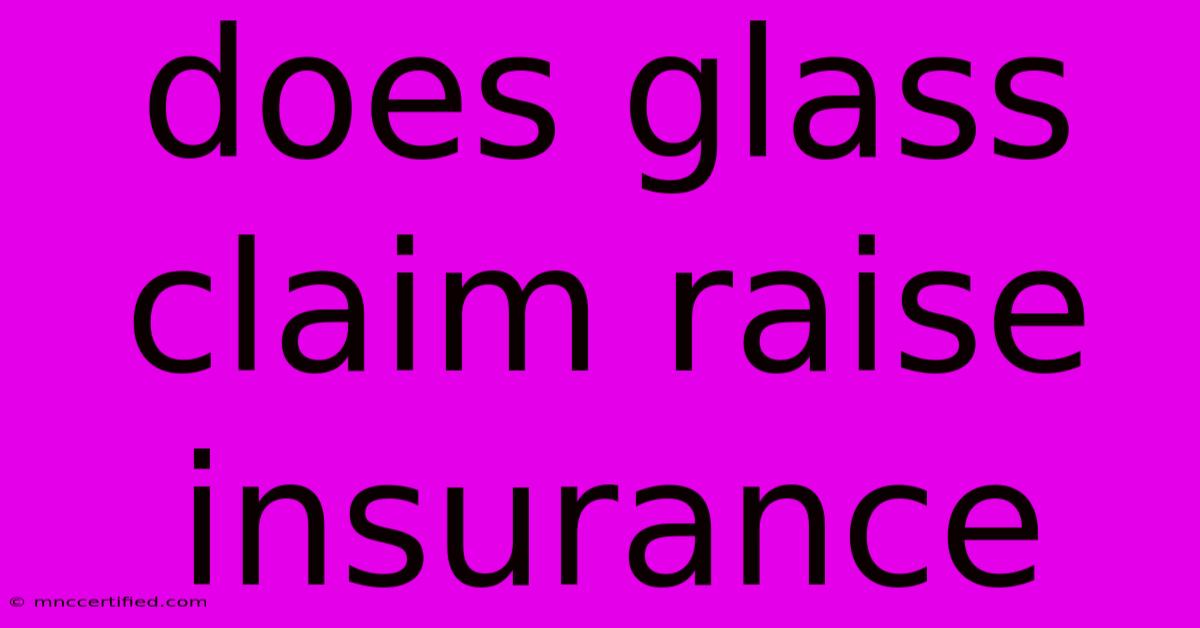Does Glass Claim Raise Insurance

Table of Contents
Does a Glass Claim Raise Your Insurance? A Comprehensive Guide
Filing a claim, no matter how seemingly insignificant, can impact your insurance premiums. This is especially true for auto insurance, but the question often arises: does a glass claim raise your insurance? The short answer is: it depends. While not always guaranteed, a glass claim can potentially lead to increased rates, but several factors determine the outcome. Let's delve into the specifics.
Understanding How Insurance Companies Evaluate Claims
Insurance companies meticulously assess risk when determining premiums. They analyze your driving history, location, vehicle type, and, of course, your claims history. Each claim filed adds to your risk profile, potentially increasing your premiums. However, the impact varies greatly depending on several factors.
Factors Influencing Premium Increases After a Glass Claim
-
Type of Insurance: Auto insurance is most frequently affected by glass claims. Homeowners or renters insurance might see less impact, depending on the policy and the nature of the glass damage.
-
Frequency of Claims: A single glass claim is less likely to significantly impact your premiums than multiple claims filed within a short period. Insurance companies view multiple claims as indicative of higher risk.
-
The Cause of the Damage: Was the damage accidental (e.g., a rock chip) or due to negligence (e.g., intentional damage)? Claims resulting from negligence tend to carry more weight and could lead to a greater premium increase.
-
Your Insurance History: A clean driving and claims history makes you a lower risk, mitigating the impact of a single glass claim. Conversely, a history of claims might amplify the effect of the glass claim.
-
Your Insurance Company: Different insurance companies have varying policies and algorithms for determining premiums. Some might be more lenient than others regarding glass claims.
-
Deductible Choice: If you choose a higher deductible, the insurance payout will be lower, potentially lessening the impact on your premiums.
When a Glass Claim is Less Likely to Affect Your Premiums
Several situations minimize the likelihood of a premium increase after a glass claim:
-
Comprehensive Coverage: Comprehensive coverage usually covers glass repair or replacement, meaning you're using a benefit included in your premium. The impact is often less significant compared to using liability coverage.
-
Small, Minor Damage: A tiny rock chip repaired quickly might not even register as a claim with some insurers.
-
Waiver of Deductible: Some insurance policies offer waivers for certain types of damage, including glass repair, further mitigating the premium impact.
-
Using Your Insurance for Repair: Using your insurance to repair damage rather than paying out of pocket, while potentially triggering a claim, could allow for professional repair that might prevent further damage in the long run.
What You Can Do to Minimize the Impact
-
Shop Around: Comparing quotes from different insurance companies before committing can help you find a provider with favorable policies for glass repair.
-
Maintain a Clean Driving Record: A spotless record significantly reduces your risk profile.
-
Consider a Higher Deductible: While this means a higher out-of-pocket cost if you do need to file a claim, it can result in lower premiums in the long run.
-
Understand Your Policy: Carefully review your insurance policy to understand your coverage and the implications of filing a claim.
Conclusion: Weighing the Pros and Cons
While a glass claim could potentially raise your insurance premiums, it's not an automatic consequence. The impact depends significantly on various factors, including the type of claim, your insurance history, and your insurer's policies. By understanding these factors and taking proactive steps, you can minimize the potential increase in your insurance rates. Always contact your insurance provider to discuss your specific situation.

Thank you for visiting our website wich cover about Does Glass Claim Raise Insurance. We hope the information provided has been useful to you. Feel free to contact us if you have any questions or need further assistance. See you next time and dont miss to bookmark.
Featured Posts
-
Suits La Welcomes Back Harvey Specter
Nov 21, 2024
-
James Bond Lotus Esprit For Sale
Nov 21, 2024
-
Cheap Car Insurance Kalamazoo Mi
Nov 21, 2024
-
Best Computer For Crypto Trading
Nov 21, 2024
-
33 66 An Hour Is How Much A Year
Nov 21, 2024